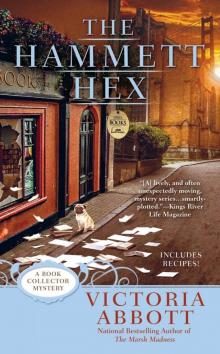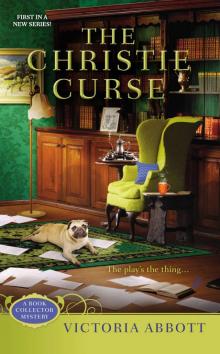- Home
- Victoria Abbott
The Christie Curse Page 2
The Christie Curse Read online
Page 2
“If you’re finished gorging yourself, perhaps we can get back to business.”
I didn’t fall into the trap of defending myself.
She said, “Take it away, Fiammetta. I never want to see food again.”
“Yes, yes, yes. Dinner at eight.”
“So,” I said, digging deep for my alleged Irish charm, “whisperings?”
Vera Van Alst’s face lit up. For the first time, her brown eyes sparkled. “There is a rumor of something very special. Just a rumor, but I must know. If it is true, I must have it. Hence you.”
“And it would be?”
She took her time, savoring every word.
“You do know Agatha Christie’s work, of course.”
“Oh yes,” I bluffed. Who on the planet hadn’t heard of Agatha Christie? But the last mystery I’d read had been a Janet Evanovich. More my era. Good explosions.
“Naturally you recall her mysterious absence in December 1926.”
“Naturally.” Um.
Vera leaned forward and lowered her voice into a deeper layer of gravel. “She never spoke of it, you know.”
“How intriguing. Although maybe not much of a stretch for a mystery writer.”
“Now it seems that she wrote something during that time.”
Postcard? “Oh really?”
“It has surfaced.”
“A book?”
“Of course not,” she barked. “Not enough time for a book. Only eleven days.”
“Short story?”
“No. But you do know that two previously unknown stories were found among her notebooks not long ago at Greenway, her home, in Devon.”
I nodded to express “of course” without actually having to tell another whopper, although whopper telling is in my DNA.
But Miss Van Alst wasn’t paying attention to me anyway.
She said, “I did my best to obtain those original manuscripts, but I was not successful.” Her fists clenched and unclenched. Important, I guessed. “But I can’t allow this one to get away.”
I had to ask. “I understand. But what is it?”
“A play. They are saying she wrote a play. I must have it. I must. Do you understand? No matter what.” Vera looked as though she could spring up from her wheelchair and perhaps float in the air.
I did understand. I know exactly how it is to want things that are just out of reach.
“What if it’s not for sale?”
“Everything’s for sale.”
I thought she might be right about that. “There will be competition.”
“Oh yes. Many people might kill for something like this.”
The hair on my neck stood up.
Kill? “Okay. And what do the whispers say about its location? Who owns it? Do you have any leads?”
She raised her eyebrow and curled her lip, not a good look for her. “None at all. That’s what I’m paying you for.”
Well, what do you know. I seemed to have passed some kind of test.
* * *
OUR NEXT STOP was the Van Alst library. Not the wonderful old brick main library in downtown Harrison Falls that had been endowed by the Van Alst family in the early nineteenth century, but the in-house version. It appeared to be about a half-mile farther down that endless corridor in what was apparently called the east wing. I hurried to keep up with Vera Van Alst, who was a speed demon in that wheelchair. The cat could barely keep up. Even rushing after the speeding wheelchair, I couldn’t help but notice more signs of disintegration of the house. A curling bit of wallpaper here, a damaged bit of woodwork there and a faded rectangle every so often indicating a painting had been removed. For repair? Or sale? For sure, no one in their right mind would buy one of the framed Van Alst ancestors, no matter who had painted them, but some of the oils in this wing looked well worth a second glance.
It had been years since the Van Alst Shoe Factory closed. The rumor was that the Van Alst funds were pretty well gone, which might explain the fact that the only newish items I’d spotted were the security system panels. Even the phone in the library was a black rotary number.
On the other hand, this massive house and the manicured acreage must cost a bomb to run. The other tale around town was that Vera had received an insurance payoff after she’d been badly injured in a car accident and that kept her going. Was it true? Harrison Falls is a boiling cauldron of gossip at the best of times, and gossip as we all know can’t be confused with fact. Was Vera selling off assets to keep going? No way to know. Yet.
I decided that as long as she had the money to pay me, all was well, because apparently, I was already on the job, whatever that would turn out to mean. Unlike the rest of the sprawling house, which was well past its glory days, the library showed no sign of neglect or decay. An additional security code was required to open the keypad that controlled the door lock. Vera kept her back to me as she entered her code. Inside, the room had its own climate control, and the temperature was cool compared to many homes. Of course, it was actually warmer than the rest of this damp and chilly house. Why was I not surprised?
Vera Van Alst wheeled abruptly in her chair. “I want to make it perfectly clear that there is never any food or drink, and by ‘never any,’ I mean not a single crumb or a drop of liquid in this environment. It doesn’t matter what blatant attempts Signora Panetone makes to entice you; one violation of this policy and you are gone. Understood?”
“Absolutely.”
“She will try.”
“Noted. And I will resist. As I mentioned before, I have worked in a rare book room. I understand the dangers that food and drink present. I am no fan of rodents. You can count on me to respect your policy.” For once, I was telling the truth.
She nodded.
“I can see you take excellent care of your collection,” I said, determined to keep the conversation going in a positive direction. I admired people who looked after whatever it was they collected. I understood and appreciated that there were soft cotton gloves to be worn when handling books, although some would argue about this. “Is the climate control just for the library?”
“Fluctuations in temperature are very bad for books.” She scowled at the thought of uncontrolled heat and cold inflicting damage.
“Of course.” I nodded knowingly.
“Insects,” she added darkly. “They can flourish if the temperature fluctuates.”
Insects? My shiver was genuine. She spotted that and seemed to approve. I was mining my brain for what I remembered from the rare book room in my college library and the fears that haunted its guardians. “Acidity too,” I said.
Vera Van Alst inhaled. “We are very careful.”
“And I see you have no natural light here.”
“Of course not,” she said as if I had suggested hosing down the collection. “Think of the damage all that ultraviolet could do.”
“Indeed. And I am sure that you needed the space those old windows would have chewed up.”
Vera’s forehead furrowed. “There’s never enough space.”
“Did you insulate when you closed them off?”
“Naturally. Although from the outside, it looks as though they are normal windows with drawn drapes.”
I smiled approvingly. I might even get to like this job.
“We keep the relative humidity at fifty percent,” Vera said, pointing in the direction of the dehumidifier.
I thought I appreciated books, but this was an altar to the book gods. It was hard not to be impressed. I didn’t know what had the most impact: the rosewood shelving, the rolling library ladders, the mezzanine floor with the ornate spiral wrought-iron staircases at each end, the carved moldings, the scent of well-loved books, or the silky Aubusson rugs in a soft faded palette of rose, sage and aqua. More to the point, there must have been twenty thousand books there, each one obviously cherished by the collector. This place was Disney World for the book lover. I inhaled the intoxicating scent of old paper, polished leather and money well spent.
I figured the rest of the Van Alst house could crumble around the pointed Van Alst ears and Vera would only retreat to the library. I was starting to understand how she felt. I hated to leave the room and the collection. It would have been a perfect experience if the cat hadn’t orchestrated a sneak attack and raked its claws across my ankle.
* * *
MY OWN APARTMENT-TO-BE was part of the old servants’ quarters, located on the highest level of the central part of the house. Signora Panetone led the way up the two flights of a dark narrow back staircase to the third floor. The staircase started between the kitchen and a rear door to the building. This was a far cry from the broad gleaming curved stairs in the front foyer. No question that this staircase led to the servants’ quarters.
I was to use this entrance and park in the rear of the building. I’d been given a key and my own security code for front and back entrances, plus a separate one for the library.
“Yes, yes, yes, no,” the signora muttered, teetering slightly whenever she spoke. Nothing she said seemed to require a response.
I would be getting a very good workout hiking up and down those stairs. I might need to invest in some sensible shoes, although that would have been an extreme solution for me.
The attic apartment would never make a magazine cover, but it only took a minute to fall in love with the slanted walls and the sense of lives lived. As a bonus, the rooms were spotlessly clean, no doubt made so by Signora Panetone. The windows looked out on the manicured grounds. The ancient cabbage rose wallpaper was artfully faded. Needless to say, there was no keypad or security code needed to access my new digs.
I would have a small sitting room with well-worn and practical furniture: a striped love seat, a leather club chair with a lived-in look and a few brass lamps. I was pretty sure that Victorian rolltop secretary desk would be very collectible. I opened a drawer and admired the dovetailing before I checked out everything else. There were no books or personal effects anywhere and no coffee table either. I find a space without books and beloved items to be somewhat eerie, but I was imagining my own books here. If this situation worked out, I could bring in my bookcase. A bar fridge, microwave, small sink and open shelves were tucked into one alcove. The bedroom was spacious enough, with an oval braided rug covering the wide plank flooring, an ornate iron bedstead and a pretty green sprigged pattern on the well-worn fabric of the bedspread and curtains. Good thing the pattern was small and delicate, because the cabbage roses on the ancient wallpaper could flatten any competition. The freestanding dark wooden armoire could hold my wardrobe if I played my cards right. The rest of it could be stashed in the walnut dresser in the far corner.
The part I liked best was the bathroom. It must have been a bedroom originally because it was as large as the other two rooms. I felt instant lust for the claw-foot tub and the 1920s-style sink and mirror, even if the latter was slightly foggy. The plumbing worked, more or less. I figured I could ignore the bell in the living room. This was the twenty-first century after all. Servants didn’t have to dash downstairs at the first ding to answer some ridiculous order regardless of the time of night. At least I had a home again. Well, for as long as I could stand Vera Van Alst and her project. And vice versa.
The Siamese purred past me, its tail sweeping against my leg just before it disappeared. I edged away, and it shot me an insulted glance before it jumped on the bed. I didn’t trust it not to rake its claws across some sensitive spot. Cats were new to me. I’d never had a pet, although I’d cried and wailed for one as a child. The Kellys don’t do pets. Doesn’t suit the lifestyle.
And I wasn’t planning to start with a furry creature that liked to leave scars.
Cat or no cat, I was thrilled and surprised at getting the job and amazed that I actually wanted it after meeting my new employer. But I did want it. I adore a challenge. And now I’d get paid for it. I found myself hoping that things would work out.
* * *
AS I STEPPED out the rear door, trying not to grin at thoughts of lounging in my very own claw-foot tub, I bumped into the invisible man. Well, I suppose he wasn’t really invisible, but he was so fair and so pale that he seemed almost translucent. I could almost have sworn that the postal uniform was walking on its own.
“So, it’s you,” he said.
“Sorry?”
“The new one. You are the new one.”
I stared. “The new what, exactly?”
He blinked and raised his pigment-free eyebrows. “Maybe I shouldn’t have said anything.”
“About what?”
As he walked past me into the house, he said with a small, reassuring smile, “I’m sure everything will be fine this time. That other thing might have been an accident for sure.”
This time I stared at his back and watched as the dark old-fashioned door closed behind him, leaving me more than a little creeped out. Our postman just drops off the mail. He doesn’t walk right into the homes on his route.
I’ve never seen him attempt to reassure anyone.
Might have been an accident?
Why did everyone in the Van Alst vicinity speak in riddles?
And what kind of accident?
CHAPTER TWO
A FAMILIAR BUZZ in my pocket indicated a text from Tiffany Tibeault, my closest friend.
How’s the job hunt?
I took the three seconds to answer. We always replied, no matter what, a steadfast rule since college. Reply and make it snappy or Tiffany will send out a search party.
Fill you in tonight…how’s life in the Great White North?
Tiff had settled into a northern Alberta pipeline camp, making good use of her degree in nursing. The girl had guts. She was always up for a challenge and never one to wait and see what happens, Tiffany had leapt at an opportunity to erase her student loans with a stint in the frozen wasteland. The wages were amazing, and there was nothing, and I do mean nothing, to spend your money on. My shrewd friend would be sitting pretty in under a year.
Stellar;) Chat tonight xo
When I’d entered my first day at college, I dreaded meeting Tiffany Tibeault. Since mid-August when dorm assignments arrived in the mail, I had been making myself miserable with one question: what kind of a person has a name like Tiffany? She would probably be the high-maintenance type, narcissistic, shallow and brimming with vapid conversation about nail polish. I was determined to hate her, but Tiffany was nothing of the sort. Her firm grip paired with her genuine smile put my month of fears to rest. A jeans-and-T-shirt girl studying nursing, Tiffany was the most gracious person ever to come out of the state of North Carolina, which is saying a whole lot. She also loved to brag that her Canadian roots gave her an uncanny ability to chug beer and drive in snowstorms, although not at the same time. We were thick as thieves before one box was even unpacked.
Life gave me a break and I spent my college years with this kindred spirit, who had no issues with my eccentric family and my resulting crises. She folded me neatly into her world, my first true “girl” friend. No doubt my social skills had been hindered by my entirely male, but not entirely law-abiding, upbringing.
I knew we’d video chat tonight and laugh ourselves senseless at both of our nontraditional work situations, and I knew she’d be incredibly jealous that I was getting to go to the Harrison Falls Public Library and with good reason.
Now, back to work. Of course, now that I had a job, I couldn’t continue to pretend to know what I really had no idea about. You can fool some of the people some of the time, but something told me you couldn’t fool Vera Van Alst for long.
First step: find out as much as possible about Agatha Christie before the next morning. If my cards hadn’t been maxed out thanks to the ex, I might have blown a bundle at the bookstore, but instead, on the way home I hit up the most w
ell-read person I know, the spectacularly hot librarian currently lighting up the Harrison Falls Public Library: Lance DeWitt. Luckily Lance was on duty.
“Hey, yeah, Jordan, everyone knows about Agatha Christie’s disappearance.”
Everybody so does not.
“It was a big deal then.”
“Imagine if Stephenie Meyer vanished for eleven days.”
“Eleven days? Did she really do that?”
“Not Stephenie Meyer or you would have known about it, but Agatha Christie did. She went completely MIA, and then she was found in a hotel at a famous spa. Poof. There was never any satisfactory explanation for what had happened. Remember this was before spin doctors and TMZ. People used to get their news from this thing called a newspaper. This story was splashed over front pages around the world.”
“I am familiar with newspapers, Lance, but thank you for the teaching moment. So it was a big story?”
“Huge. Some people thought her husband had killed her. He had a mistress he wanted to marry, so he was pressuring Dame Agatha for a divorce at the time and she wasn’t so keen on it. The whole world followed her disappearance.”
“Eleven days.”
Could a person write a play in eleven days? Sometimes it takes me two weeks to compose a text message.
“You want to know about it? We’ve got every book on the topic. Want me to select some for you?”
One thing you could say about Harrison Falls Public Library, the service was good. And easy on the eyes.
Five minutes later I staggered out to my car with far more than I’d ever wanted to know about the late great Agatha Christie. It was going to be a long night. Still, I was in a good mood because Lance had that effect on me. Always.
I noticed a police cruiser up ahead as I drove along Bird Street and as usual when that happens, I made a sharp, and unplanned, left turn to take a different route. Five blocks and three turns later, there he was again. I recognized the officer in the patrol car. I’d seen him around since I’d come home, and he seemed like a friendly and even harmless type, but in my family, we never want to attract the attention of the cops. Especially the type who can anticipate your left turns. Was I losing it or did Officer Whozit just smile and wave? That was more unnerving than spotting flashing roof lights in the rearview mirror.

 The Hammett Hex
The Hammett Hex The Wolfe Widow (A Book Collector Mystery)
The Wolfe Widow (A Book Collector Mystery) The Marsh Madness
The Marsh Madness The Christie Curse
The Christie Curse